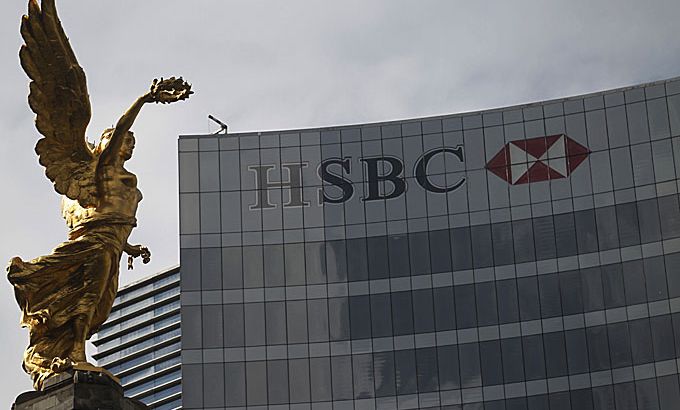
HSBC’s fine: A rap on the knuckles
Is the British bank’s $1.9bn fine for money-laundering enough, plus, is the influence of US trade unions declining?
A British bank has been ordered to pay $1.9bn after laundering money for what the US Department of Justice termed ‘drug kingpins’ and ‘rogue nations’.
HSBC advertises itself as the world’s local bank but had to pay a heavy fine for doing business with some rather dubious clients who used the bank to move billions of dollars around the financial system.
Keep reading
list of 4 itemsWhy are nations racing to buy weapons?
Parallel economy: How Russia is defying the West’s boycott
US House approves aid package worth billions for Ukraine, Israel
US prosecutors said the bank was guilty of a ‘blatant failure’ to implement anti-money-laundering controls and willfully flouted US sanctions. Nearly $900m in drug trafficking money was laundered through HSBC accounts in Mexico.
|
Jeffrey Robinson says concerns that indicting HSBC would destabilise global finance was unfounded |
A US Senate investigation also found that the bank circumvented US safeguards designed to block transactions involving terrorists, drug lords and rogue states.
It provided US dollars and banking services to some banks in Saudi Arabia despite their alleged links to terrorist financing.
HSBC was also found to have regularly bypassed restrictions on dealing with Iran, North Korea and other states subject to US sanctions.
The bank’s chief executive said he was profoundly sorry, and the penalty includes a five-year agreement, which also means HSBC will not be criminally prosecuted in the US, to install an independent monitor to strengthen its compliance policies and procedures.
The bank which operates in 80 countries and which made pre-tax profits of $21.9bn last year saw its share price rise when the size of the fine was announced.
Inside Story Americas asks: Is imposing a fine on HSBC for money-laundering sufficient punishment? And what does it take for a bank to get prosecuted?
|
“I find that the decision by the justice department not to indict them for criminal money-laundering … scandalous. This is not just some petty little incident. This is a huge conspiracy to bring Mexican drug cartel money through the US financial system … [The fear by the justice department that an indictment would destabilise the global financial system] is not a valid concern. First of all, you’re not bringing down the bank. You’re charging the bank and various bankers with a criminal act, and they should be held accountable.” Jeffrey Robinson, a money-laundering expert and the author of Laundrymen |
Is the influence of US trade unions declining?
In Michigan, a traditional stronghold of the US labour movement, the state senate has passed right-to-work legislation last week limiting union power in the face of large-scale protests.
The measure means employees will no longer have to sign up to a trade union as a condition of employment. It also bans compulsory union fees.
|
“It is a misnomer. There is no right to work. It would be better described as a right to be greedy, because what this really is, is that it says in essence that a worker does not need to pay dues or a fee but can receive the benefits of collective bargaining.” – Bill Fletcher Jr, an author and a social activist |
There have been large-scale protests against the move in Lansing, the capital of Michigan state, which is home to the US auto industry and also the richest US union, the United Auto Workers.
Earlier this week, Barack Obama, the US president, condemned the move in Michigan.
Supporters say the laws give workers freedom and attract new business. Critics, however, argue that the laws lower workers’ salaries and weaken union power.
When Michigan Governor Rick Snyder signs the legislation, the state, where about 17.5 per cent of residents are union members, will become the 24th right-to-work state in the US.
So, is the influence of US trade unions declining?
To discuss this Inside Story Americas is joined by guests: Bill Fletcher Jr, an author and activist who has been a member of several unions; and Josh Eidelson, a labour journalist who contributes to The Nation and Salon.
|
“[The Michigan laws] show the ascension of far-right anti-union forces with the Republican party and it also shows the tremendous political vulnerability of unions. As unionisation has declined in the US, unions have become much more vulnerable and it’s been easier to stir up resentment against union benefits.” Josh Eidelson, a labour journalist |
Some of the union benefits in right-to-work states:
- Whether in a union or not, the average worker in a right-to-work state makes $1,500 less than workers in states without these laws
- They are much less likely to have health insurance provided by their employer or pensions
- These states also have the lowest rates of union membership across the US, the rate of union membership was 11.8 per cent last year, down from 35 per cent in 1954